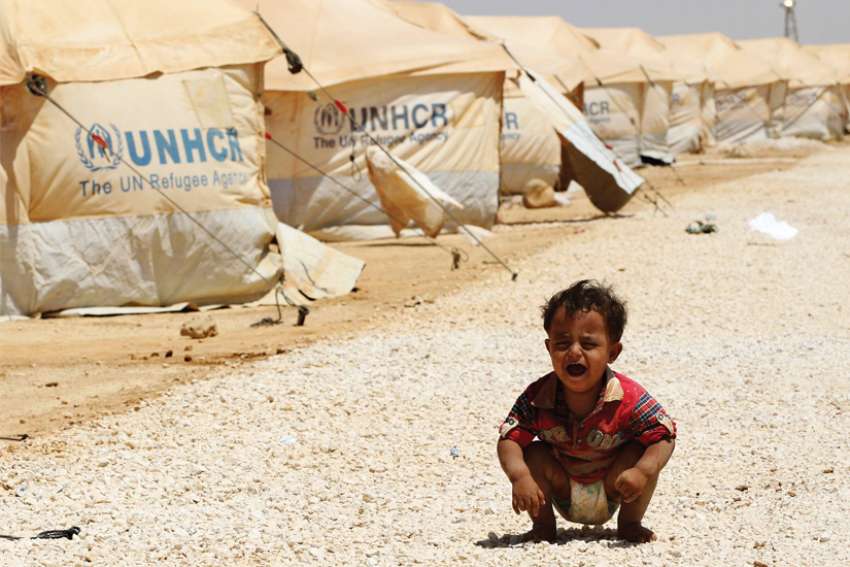But the JBK and Son Endowment for refugees sponsored through the Archdiocese of Toronto’s Office for Refugees has broken out of that mold. What started off as a gift of just under $151,000 has grown to $167,000.
That doesn’t mean that the endowment isn’t being used to help refugee families. It’s not just mouldering away in some dark bond account.
That money has sped the journey to Canada for dozens of refugees and helped struggling immigrant families in Toronto to reunite with their refugee relatives sooner.
Brendan Killackey and his father James set up the endowment in the teeth of the Syrian refugee crisis in 2015, when the image of three-year-old Alan Kurdi lying dead on a beach dominated the media. Kurdi and his Syrian family were hoping to reunite with relatives in Vancouver, where Brendan Killackey was living at the time.
Brendan and his father (since deceased) were moved by the plight of Syrian and Iraqi refugees, especially the “double discriminated Yazidis and Chaldeans,” Killackey told The Catholic Register.
They were also scandalized that it was the slowness and expense of the sponsorship process that pushed the Kurdi family to try their luck in a rubber dinghy to Greece.
The Killackey’s initial thought was to offer their investment property, a condo in Toronto, as transitional housing. But that’s not the way the refugee system works. Sponsors, usually family members already living in Canada, arrange for housing and the Canadian government won’t bring a refugee unless housing is assured.
Then they thought they could sell the condo, give it to the Archdiocese of Toronto, to finance a number of refugee sponsorships. But the base cost of supporting an average refugee family for one year, which is the legal requirement laid on sponsors, is about $40,000, depending on the size of the family. The $150,000 realized from the sale of the condo would be gone pretty quickly.
Instead, the archdiocese suggested that money from the sale of the condo be put into a fund to backstop refugee sponsorship applications. Immigration, Refugees and Citizenship Canada requires a sort of insurance deposit of over $12,000 per refugee.
It’s money set aside and only to be used in cases where the sponsors fail to support refugees. That $12,000 per sponsored family member can be a steep hill to climb for immigrant families in Canada trying to get their loved ones out of difficult and often dangerous situations, just to have that money sit in a trust fund.
Instead of making these families
raise upwards of $30,000, the JB Killackey and Son Endowment pledges to cover those costs should a sponsor default. In almost every case, sponsors in fact do support their refugees and the money remains in the endowment. The endowment has dispersed about $33,000 but the fund has also been growing with its investments.
“I thought it would just draw down over five years or something,” Killackey said.
At this point the 63-year-old retired engineer believes the endowment will outlast him, as part of his own estate. The idea of leaving behind something that will help people after he’s gone is satisfying for Killackey.
“It gives you a slightly different take, when you have something that you created, or that you are related to, put into your estate,” he said.
Deciding to help refugees wasn’t just an emotional reaction to the Alan Kurdi pictures. For the Killackey family there was a particular resonance with refugees. James had grown up in a depression-era Irish family, just a couple generations removed from the great potato famine followed by the struggles of Irish independence. He came to Canada with little more than the prayers and well wishes of his family to back him up.
“You know, to leave family and show up in a new country to make his way, I considered him a refugee in some terms,” Killackey said.
The gratitude that was rooted in James Killackey’s immigrant experience expressed itself in big-hearted generosity.
“He had a deep, Irish faith and so did a lot with the Church and through the Church,” Killackey recalled.
His son was also inspired by the example and priorities of Pope Francis.
“To come in with not the fancy apartment, not the frills and speak a lot about the poor,” Killackey said. “That’s probably another driver for me, Pope Francis.”
Killackey still marvels at how his initial intention to house refugees was transformed into a sophisticated financial tool for refugee sponsorship that is still growing.
“When giving or planning, go with the flow,” he said. “You don’t know where it’s going to end up.”


